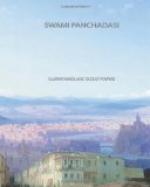Prof. W.F. Barrett, Professor of Physics in the Royal College of Science for Ireland, conducted the most of the experiments. The report to the Society says: “We began by selecting the simplest objects in the room; then chose names of towns, people, dates, cards out of a pack, lines from different poems, etc., in fact, any thing or series of ideas that those present could keep in their minds steadily. The children seldom made a mistake. I have seen seventeen cards chosen by myself named right in succession without any mistake. We soon found that a great deal depended on the steadiness with which the ideas were kept before the minds of the thinkers, and upon the energy with which they willed the ideas to pass. I may say that this faculty is not by any means confined to the members of one family; it is much more general than we imagine. To verify this conclusion, I invited two of a neighbor’s children to join us in our experiments, with excellent results.”
The report gives the methods of the experiments, as follows: “The inquiry has taken place partly in Mr. Creery’s house, and partly in lodgings, or at a hotel occupied by some of our number. Having selected at random one child, whom we desired to leave the room and wait at some distance, we would choose a pack of cards, or write on a piece of paper a name of a number which occurred to us at the moment. Generally, but not always, this was shown to the members of the family present in the room; but no one member was always present, and we were sometimes entirely alone. We then recalled the child, one of us always assuring himself that, when the door was suddenly opened, she was at a considerable distance, though this was usually a superfluity of caution, as our habit was to avoid all utterances of what was chosen. On re-entering, she stood—sometimes turned by us with her face toward the wall, oftener with her eyes directed toward the ground, and usually close to us and remote from the family—for a period of silence varying from a few seconds to a minute, till she called out to us some number, card, or whatever it might be.”
In the first experiments, in “guessing” the name of objects, the child guessed correctly six out of fourteen. She then guessed correctly the name of small objects held in the hands of one of the committee—five times out of six. She guessed fictitious names chosen by the committee—five out of ten, at the first trial. The committee then tested her by writing down the name of some object in the house, fixed at random, and then, after all had thought intently of the thing, they sent for the child and bade her try to find the thing thought of, the thought-concentration of course continuing during the search. The result is thus reported: “In this way I wrote down, among other things, a hair-brush—it was brought; an orange—it was brought; a wine-glass—it was brought; an apple—it was brought; and so on, until many objects had been selected and found by the child.”




